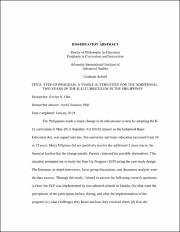| dc.description.abstract | The Philippines made a major change in its educational system by adopting the K-12 curriculum in May 2013. Republic Act 10533, known as the Enhanced Basic Education Act, was signed into law. Pre-university and basic education increased from 10 to 13 years. Many Filipinos did not positively receive the additional 2 years due to the financial burden that the change entails. Parents clamored for possible alternatives. This situation prompted me to study the Step-Up Program (SUP) using the case study design. The literature, in-depth interviews, focus group discussions, and document analysis were the data sources. Through this study, I aimed to answer the following research questions: (a) how the SUP was implemented by two selected schools in Manila; (b) what were the perceptions of the participants before, during, and after the implementation of the program; (c) what challenges they faced and how they resolved them; (d) how the
competencies set by DepEd were met; and (e) whether the SUP was a viable alternative for the additional 2 years.
The findings indicate that the SUP was implemented after careful planning, which included teacher training, and preparation and evaluation of instructional materials. The participants viewed the implementation of SUP from different perspectives. Before the implementation of the program, they welcomed it with mixed emotions—excitement, confidence, and apprehension. During the implementation, the participants described their experiences as bumpy and unstoppable. After the implementation, the administrators described themselves as reflective observers; and teachers, students, and parents described themselves as triumphant riders. All the participants identified the same challenge, which was time. All of them, however, underscored that they were able to resolve their challenge successfully. The participants underscored that the SUP met the competencies set by DepEd and that it was a viable alternative for the additional 2 years. Finally, the researcher provided recommendations to stakeholders and future researchers. | en_US |

